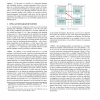8413 search results - page 6 / 1683 » Ordering Problem Subgoals |
113
click to vote
ICML
1990
IEEE
15 years 6 months ago
1990
IEEE
Given an adequate simulation model of the task environment and payoff function that measures the quality of partially successful plans, competition-based heuristics such as geneti...
120
click to vote
SIAMSC
2011
14 years 9 months ago
2011
We propose a numerical method to approximate the solution of second order elliptic problems in nonvariational form. The method is of Galerkin type using conforming finite elements...
127
click to vote
SIAMNUM
2011
14 years 9 months ago
2011
We introduce a new mixed method for the biharmonic problem. The method is based on a formulation where the biharmonic problem is re-written as a system of four first-order equatio...
131
click to vote
STTT
2010
14 years 9 months ago
2010
Abstract. Partial order reduction limits the state explosion problem that arises in model checking by limiting the exploration of redundant interleavings. A state space search algo...
122
click to vote
ECAI
2004
Springer
15 years 7 months ago
2004
Springer
In this paper we describe IPSS (Integrated Planning and Scheduling System), a domain independent solver that integrates an AI heuristic planner, that synthesizes courses of actions...


